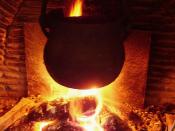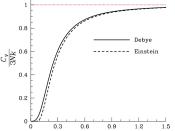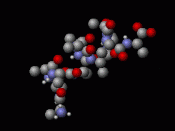Physics
Specific Heat of Metal and Water
Purpose: To determine which substance has higher heat capacity; water or metal.
Background Information:
1)Temperature: Quantity that tells how hot or cold something is compared to a standard.
2)Heat: Energy that transfers from one object to another because temperature difference. It is energy in transit from a body of higher temperature to one of lower temperature.
3)Mass: measure of an object's inertia or the amount of matter in an object.
4)Specific heat is the amount of heat needed by 1 gram of a substance so that it changes by 1 degree Celsius.
5)Specific heat â Energy â Ek (kinetic)
â Ep (potential)
Materials: 2 beakers, hot plate or 2 identical lab burners, 2 thermometers, 1 piece of lead, balance.
Hypothesis: I think that the metal will have a higher heat capacity because metal uses almost all the energy (heat) to increase its particles kinetic energy while water tends to store its energy.
Procedure:
1)Determine the mass of the two beakers.
2)Determine the mass of the lead and place it in one beaker with an egual mass of water.
3)Add water to the beaker equal to the mass of water and lead in the first beaker.
4)Place the two beakers on the hot plate or over the two burners so that the beakers are receiving equal amounts of heat.
5)Observe and record what the change in temperature every 15 seconds.
Data:
1st beaker: 222.4 grams
2nd beaker225.7 grams
Lead: 31 grams
1st Beaker + water: 253.4 grams
1st Beaker + water + lead: 284.4 grams
Water + lead: 62 grams
2nd beaker + water: 287.7 grams
Timeâ TBeaker (lead) Tempâ Temp.Beaker Tempâ Temp
Start0270270
151538113811
3015479446
451563165410
60157512628
7515827708
9015897799
10515956856
Conclusion: My hypothesis turned out to be correct...


